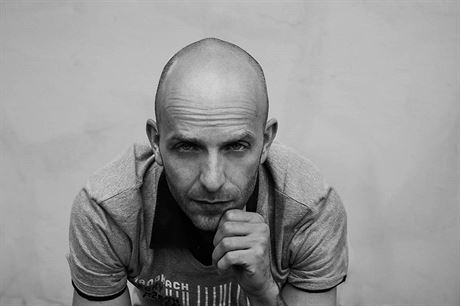 Our last conversation was at the occasion of the festival NANOHACH in Czech 2013. Back then I asked you whether this event was meant to start a new tradition and you told me that it wasn’t your plan to continue with it. And lo, it is 2015 and NANOHACH in Czech is here again…
Our last conversation was at the occasion of the festival NANOHACH in Czech 2013. Back then I asked you whether this event was meant to start a new tradition and you told me that it wasn’t your plan to continue with it. And lo, it is 2015 and NANOHACH in Czech is here again…Maybe it was you who gave roots to the idea (laughs). At the beginning there was no such intention. We thought of the festival as a one-off spurt of new possibilities and presentation of our work in a concentrated form. In the end, the variability, intensity and performance in three cities became a motivation for us to continue in our work and the reason why in the end, last year we changed our mind. We wanted to present our production in other cities as well – in those where contemporary dance is almost at home and where it works as a part of the artistic diversity of the community. This year the festival takes place in Prague again but logically, we also chose Pilsen as it is the European city of culture. And the last choice was Pardubice. So will there be NANOHACH in Czech 2017?
I don’t know yet. It depends on time, current projects and other circumstances. It’s not necessary to make it some sort of tradition or repetition at all costs. The festival in Pardubice has already taken place. What are your impressions?
The impressions are definitely good, I can’t think of anything unflattering, maybe apart from the fact that not many spectators came during the three days. I don’t want to discuss the reasons because it’s demotivating. I think I have certain limits in terms of attacking the spectators with advertising. I keep hoping that those that are interested in dance can look it up themselves. And what about some positive experience?
My positive experience is mostly related to the first public presentation of Dialogues. The conception of the intention of this artistic and educational project is completely different from what we have been doing so far. And it is important for us as authors that this project has been carried out. Apart from choreographers, amateur dancers who attend dance classes at a primary school and an art school in Karlovy Vary also take part in the project. These classes are led by Petra Blau, a dancer from the Pilsen ensemble NoTa, in which Lenka Jíšová is also involved. Dialogues are not just a performance, the programme lasts for a whole day – there are dance workshops, informal debates or screenings of dance films. In terms of the programme it is a very demanding day for all of us and therefore we had big expectations about how it would turn out. The atmosphere was small but very friendly and personal – and that is the most important thing. It was our first time of organizing such an event and we succeeded in presenting high quality work. Why did you choose these particular regions and the amateur scene when creating Dialogs?
Thanks to several festivals we observe this scene on a long-term basis and so we know their work. Many students from these cities come to Duncan perfectly prepared by their teachers. We know the production of Petra Blau and Lenka Jíšová. And we also made the decision because of our intuition. I find it important to be in contact with the amateur scene. It is very common abroad as well, the Czech people just don’t know about it. It is important to try to find possibilities and opportunities for the professional scene to meet with the young and, for the time being, amateur scene. It is crucial not to isolate ourselves from other worlds. We need to get to know the others and their work from the inside, which is difficult, but rewarding and it may even help us fight stereotypes. It is also related to the local attempts to bring dancing to schools. Another point of the programme is an evening called Future Promises, in which students from the Duncan Centre take part with their choreographies. Can you tell us more about the programme?
The students of Duncan were a part of the Prague part of the festival already two years ago. I wasn’t the only one who thought it was a very special evening. It is also an opportunity for the students to experience what is awaiting them in future and to share a common evening with others. It was only natural to include a part like that again. This year we are taking the students to all the three cities. We picked the three choreographies from final exam works and absolvent concerts. The evening will be very diverse. We will present pieces of two graduates who decided to continue with their studies - from October they are at SEAD in Salzburg. It will be a solo by Johana Pocková and a duet by Michaela Kadlčíková. There will also be a secondary school graduation work, a trio by Jitka Čechová. That means the bond between NANOHACH and the Duncan Centre Conservatory, which is a background of you all, remains strong…
We are graduates of Duncan, we have the same philosophy, so logically, this bond is something we believe in. There’s no need in pointing it out all the time but for us it is natural; most of us are also teachers at Duncan. Is it just my impression or have the members of NANOHACH in this year’s new productions changed their role of performers for the roles of choreographers, consultants and authors of ideas? I’m not talking about Michal Záhora and his piece Devoid, that is an exception.
I don’t know whether we can call it a development, more probably it is just a coincidence. The reason for that were mainly this year’s grant cuts, which meant that if we were in the position of performers, we would have to cancel one performance. But all the members of the ensemble are both creative dancers and choreographers. We studied at a school that is creative and helps students develop as performers, as well as authors. Our roles depend on the time and the particular period. To what extent have NANOHACH been influenced by the fact that they didn’t get any grant support from the Prague Municipality for 2015? Is there at least something positive about that?
It is always eventually true that every cloud has a silver lining. At the end of the last year we sent an application for Michal Záhora’s project to the European programme SpectACTive!. We hadn’t planned it in advance and we registered it under the working title Letters (choreography Devoid, author’s note). And it worked out and Michal was given the opportunity to go for it. Our time is not unlimited and therefore we can’t be sure whether we would be able to put in practice this big international project as well as everything that we had planned if we also obtained grant support from the municipality. In the end I think everything is as it is supposed to be. And even though the Dialogues project was not supported by the municipality, as the grant commission saw it as a step back, we managed to carry it out. It is very important to us because we’ve believed in this project a lot. It may actually be an inspiration for the dance scene. All of us as artists are in contact with the coming generation. Not only do we talk to them as to spectators, we are now also collaborating with them as with authors, co-workers and active people. Honza Malík (*1975) is a dancer, teacher, occasional choreographer, producer of contemporary dance and cofounder of the NANOHACH ensemble. He has been working freelance in the area of contemporary dance theatre since 1999 when he graduated from the Duncan Centre Conservatory. In 2004 he was at the birth of the dance theatre ensemble NANOHACH which he has been forming and in which he has been working as a dancer, producer and manager since the beginning of its existence. All performances of NANOHACH were created under his auspices and thanks to him they are regularly presented in the Czech Republic as well as abroad. He has been nominated for the Prize for the Best Interpretation 2008 (DeRbrouk) and for the prize Dancer of the Year 2010 (motion quasi-opera Crime and Punishment). In Russia he was awarded the Best Actor Critics Award 2011 (DeRbrouk). In 2014 he received the Tribute of the Festival …příští vlna/next wave… In 2011–2013 he worked as a production and creative initiator of the choreographer MAIA (Prague/Basilej). He has also initiated the creation of a programme section for contemporary theatre called space4dance for the Prague Pride festival (operating since 2013). Apart from these activities he is also interested in Czech folklore (in 1981–2005 he was a member of the Song and Dance Ensemble Rokycany and he was also its artistic and choreographic leader from 1996). He cooperates with the Military Artistic Ensemble Ondráš in Brno, the Mladina folk ensemble from Pilsen, the Prague Gaudeamus ensemble and the ethnographer and choreographer Daniela Stavělová. Since 2007 he has been teaching folk dance at the Duncan Centre Conservatory and other places in the Czech Republic. Translation: Zuzana Sovová




Josef Bartos
Thank you for your thoughts. One got stuck in my mind – that passion makes us different from AI. Just yesterday I read…I am a dance critic. I am a member of an endangered species